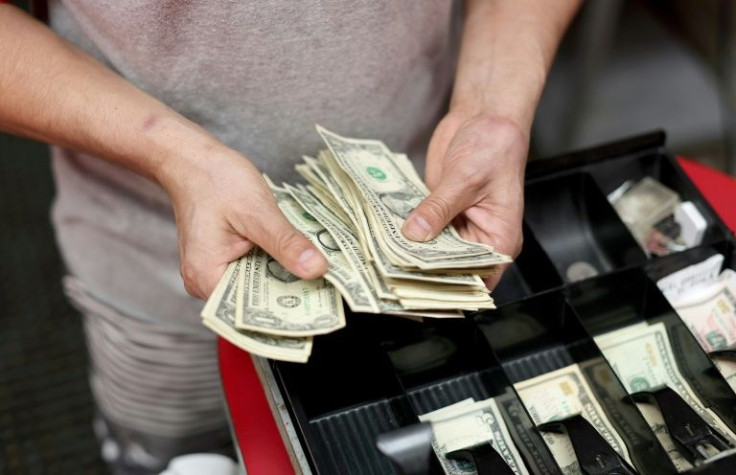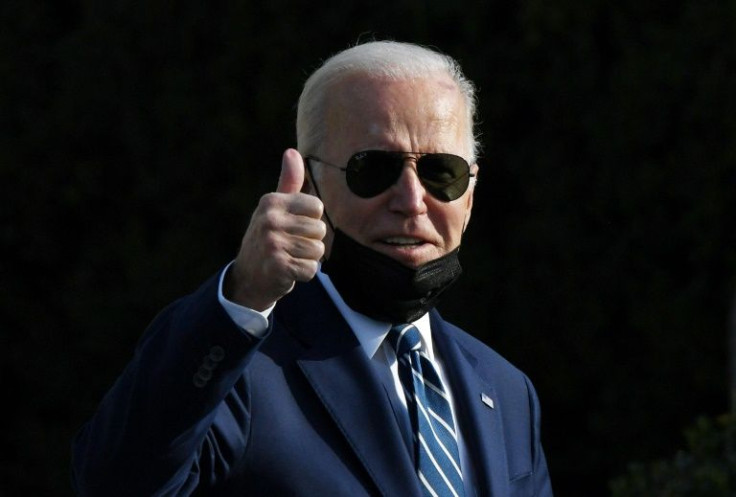How Much Can A President Control The Economy? Experts Say It Is Tough To Tell
After a challenging first year in office, President Joe Biden can claim that the U.S economy is cruising back to a healthier place after being ravaged by the COVID-19 pandemic for the past two years.
At a press conference to mark his first year in office, Biden rattled off statistics before the press corps to make the case that his administration was off to a smashing start. He cited a "biggest drop ever" in child poverty "in American history” under his administration, unemployment falling to 3.9%, a surge in business applications, and an increase in income for Americans across the board, a point Biden appeared to take a certain pride in.
Indeed, other measures like gross domestic product, widespread access to COVID-19 vaccinations, and nailing down billions in new infrastructure spending tell a good story. But if the economy is doing so well, why are Americans so pessimistic about it under Biden?
In a recent consumer confidence survey by the University of Michigan, Americans expressed little optimism that economic conditions will improve in the short term. In another poll conducted by Change Research and CNBC, 73% of respondents rated the economy's position as "poor" or "not in good shape." When asked about Biden's handling of the economy, a 60% majority said they disapproved.

Much of this agony can be attributed to a rise in inflation to levels not seen in decades. As of last week, U.S inflation was standing at 7.5%, a result primarily chalked up to high energy prices and choked global supply chains. Biden promises to “work like the devil” to tame inflation, but he may be missing a serious obstacle; some of these problems may be beyond any president’s capacity to control.
Presidents campaign on ambitious promises to fix or expand the economy and their legacies are cemented into history by how far they fulfilled these promises. Yet political scientists and economists alike remain divided on just how much presidents are responsible for the economies they inherit or leave behind.
Donna Hoffman, an associate professor of political science at the University of Northern Iowa, says that presidents often are the victim of what political scientists refer to as the "expectation gap", or the difference between what the public expects them to accomplish and what is actually possible. Often, the way presidents campaign, she explained, sets them up for harsh judgment when they do not appear to be delivering on what they promised to do.
“The public expects presidents to carry through all of these promises, but there is a real gap in terms of the tools a president has to do these things,” Hoffman told International Business Times.
In a research paper from 2014, Princeton economists Alan Blinder and Mark Watson looked to divine why some presidents did better on the economy than others. In an anti-climactic conclusion, they posit that the presidents who did the best job were often blessed with favorable circumstances throughout their terms in office.
For example, Jimmy Carter’s administration presided over solid growth rates before being undone by inflation spurred by a hawkish Federal Reserve that raised interest rates into the double digits in response to a sharp drop in oil production in the Middle East.
This sparked a recession that not only contributed to his defeat but carried over into the first years of Ronald Reagan’s first term before both interest rates and oil prices began to fall. As a consequence, Reagan is remembered as universally better on the economy than Carter despite subsequent debates about whether his own policies may have proven problematic in the long term.
Why this example is useful is because they illustrate just how much factors outside a president’s total control -- monetary policy and global oil markets -- play a part in how well an economy performs during their term.
If Biden has a direct parallel in any way to this today, it is the reality that resolving supply chain issues that directly contribute to inflation is something he can only do so much to resolve. The same can be said about his sway over the decisions of the Federal Reserve or the emergence of more contagious variants of COVID-19.
Another salient problem inherent to a president’s power to sell their economic achievements to Americans is a matter of perception. Hoffman explained that presidents have always confronted this notion public perceptions of the economy “not always match” a reality that shows the underlying fundamentals of the economy as strong
Christy Setzer, the President and Founder of New Heights Communications in Washington D.C and veteran of several political campaigns, says Biden is running up against a narrative that his administration is unclear on what it has achieved. He will need more than the numerical measures he has relied on to make the best case for voters going forward.
“The biggest challenge for the Biden administration is breaking through the current narratives about it,” Setzer told International Business Times.
“Statistics do not create a lot of enthusiasm by themselves. You need a good story to tell and you need people to believe it,” she added.

But Biden has one final challenge - hyperpartisanship.
Every U.S president has dealt with partisanship. Franklin Roosevelt, for example, was labeled everything from a “bolshevik” to a “fascist” when enacting the New Deal while Senate Republicans early on promised that Barack Obama would be “one-term president” at a time when the economy was still battered by the Great Recession.
Data also shows that there is a stark divide in perceptions of the economy’s well-being that is linked to which party is currently in charge.
In one analysis that examined views of whether the economy was getting worse between June 2016 and May 2021, Republicans' confidence soared under President Trump with less than 10% saying the economy was worsening between 2018 up to the start of the COVID-19 pandemic. Democrats' views were similar in their lopsided optimism by the halfway point of Biden's first year, but their views did not diverge nearly as Republicans' did after Trump's term ended.
Barbara Perry, the Director of Presidential Studies at the University of Virginia’s Miller Center said it is true that modern polarization, particularly on the political right, has sharply diminished chances of achieving a consistent view of the economy today.
This, together with structural flaws - such as partisan gerrymandering, the high costs of campaigning to gain traction and social media silos - has dramatically worsened the division in Washington. This almost uniquely makes it more difficult for Biden to tout any of his economic achievements to win voters in 2022 and possibly 2024.
“Partisanship and severe polarization are the story of our politics” and therefore economy,” Perry told International Business Times over the phone.
© Copyright IBTimes 2024. All rights reserved.





















